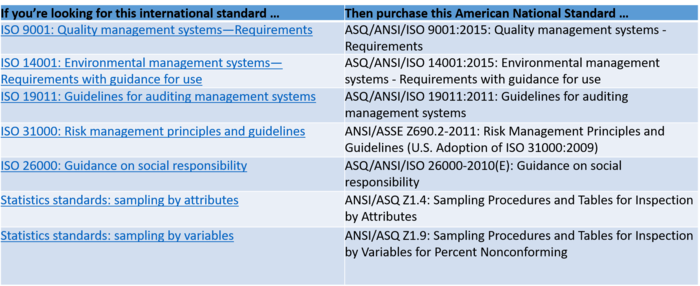American National Standards Institute (ANSI)
ANSI (American National Standards Institute) is the primary organization for fostering the development of technology standards in the United States. ANSI works with industry groups and is a U.S. member of the International Organization for Standardization (ISO) and the International Electrotechnical Commission (IEC).[1]
Under ANSI's supervision, Accredited Standards Committee X9 (ASC X9) oversees the global financial services industry and is responsible for all financial-services standards in the U.S. In that capacity, ASC X9 plays a key role in the introduction of new banking technologies. Examples include standards for paper and electronic checks, credit card magnetic stripes, and ATM cards. The American Bankers Association provides administrative support for ASC X9 standards.[2]
Since it was founded in 1918, the American National Standards Institute (ANSI) has coordinated the development of voluntary consensus standards in the United States and has represented the needs and views of U.S. stakeholders in standardization forums around the globe. ANSI is the U.S. member body of ISO and, via its U.S. National Committee, the International Electro-technical Commission (IEC). ANSI is also a member of the International Accreditation Forum (IAF). ANSI does not write standards; rather, the Institute accredits standards developers that will establish consensus among qualified groups. Its guiding principles " consensus, due process, and openness " are followed by the 220 distinct entities currently accredited to develop and maintain nearly 10000 American National Standards (ANS). Though all ANS are developed as voluntary documents, U.S. federal, state, or local bodies are increasingly referring to ANS for regulatory or procurement purposes. Many ANS are also national adoptions of globally relevant international standards. The Institute's membership is comprised of a broad range of businesses and industrial organizations, standards-setting and conformity assessment bodies, trade associations, labor unions, professional societies, consumer groups, academia, and government organizations for the purpose of enhancing global business competitiveness and improving the quality of life for the world's citizens. The interests of more than 125000 companies and 3.5 million professionals are represented through ANSI's headquarters in Washington, DC, and its operations office in New York City.[3]
Responding to national priorities and areas requiring cross-sector collaboration are key focuses for ANSI’s activities. The Institute establishes ongoing standards panels, collaboratives, and partnerships as well as timely workshops to address standardization needs. These initiatives coordinate the efforts of the private and public sectors to identify gaps in existing standards and make recommendations for future work. They rely on the cooperation of volunteers from across industries and sectors. Recent areas of standards coordination activity include:
- Energy efficiency
- Electric vehicles
- Homeland security
- Smart cities
- Service Economy
- Nanotechnologies
- Cyber Security
- Nuclear energy[4]
ANSI Initiatives[5]
- In 2008 ANSI, in partnership with Citation Technologies, created the first dynamic, online web library for ISO 14000 standards.
- On June 23, 2009, ANSI announced a product and services agreement with Citation Technologies to deliver all ISO Standards on a web-based platform. Through the ANSI-Citation partnership, 17,765 International Standards developed by more than 3,000 ISO technical bodies will be made available on the citation platform, arming subscribers with powerful search tools and collaboration, notification, and change-management functionality.
- ANSI, in partnership with Citation Technologies, AAMI, ASTM, and DIN, created a single, centralized database for medical device standards on September 9, 2009.
- In early 2009, ANSI launched a new Certificate Accreditation Program (ANSI-CAP) to provide neutral, third-party attestation that a given certificate program meets the American National Standard ASTM E2659-09.
- In 2009, ANSI began accepting applications from certification bodies seeking accreditation according to requirements defined under the Toy Safety Certification Program (TSCP) as the official third-party accreditor of TSCP’s product certification bodies.
- In 2006, ANSI launched www.StandardsPortal.org, an online resource for facilitating more open and efficient trade between international markets in the areas of standards, conformity assessment, and technical regulations. The site currently features content for China, India, and Korea, with additional countries and regions planned for future content.
- ANSI design standards have also been incorporated into building codes encompassing several specific building sub-sets, such as the ANSI/SPRI ES-1, which pertains to "Wind Design Standard for Edge Systems Used With Low Slope Roofing Systems", for example.
ANSI vs ISO: List of standards (See Table Below)[6]
See Also
- International Organization for Standardization (ISO)
- International Accreditation Forum (IAF)
- International Electro-technical Commission (IEC)
- Accredited Standards Committee (ASC)
References
- ↑ What is American National Standards Institute (ANSI)?
- ↑ What does Accredited Standards Committee X9 oversee
- ↑ Explaining American National Standards Institute (ANSI)
- ↑ Recent Standards Coordination activities of American National Standards Institute (ANSI)
- ↑ Some ANSI Initiatives
- ↑ ANSI vs ISO: List of standards

